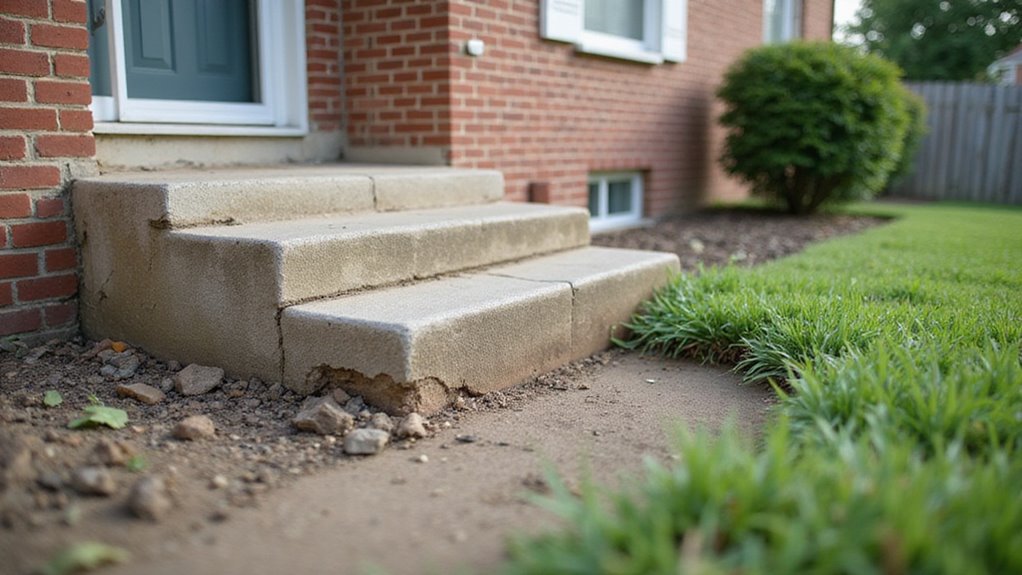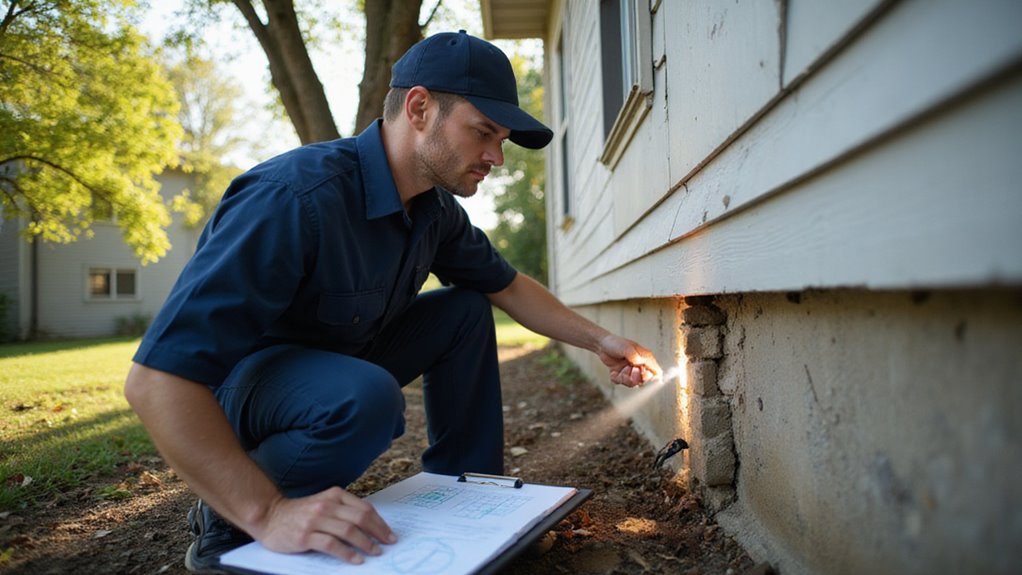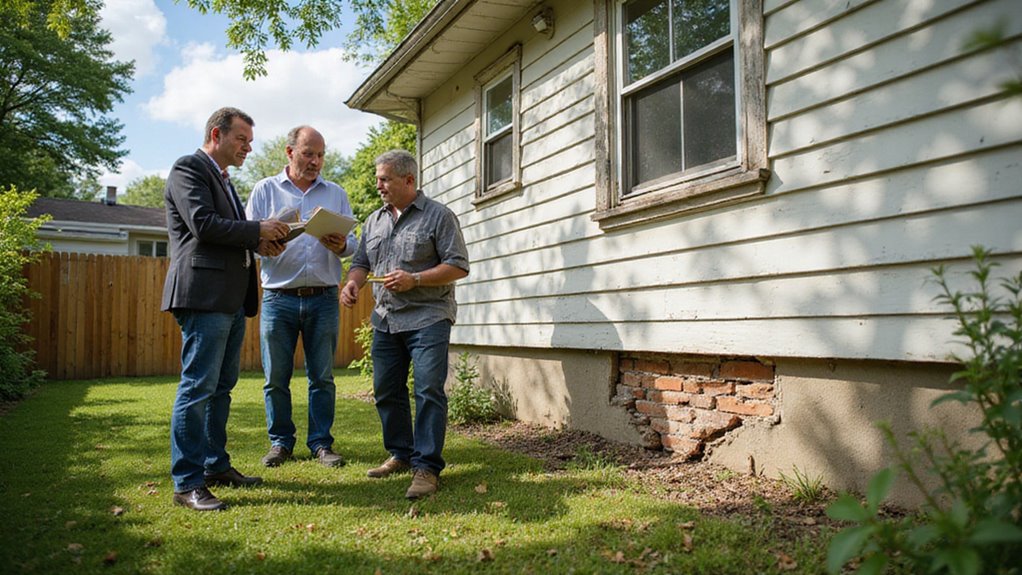Selling a house with foundation damage is a tough challenge. Many buyers get scared off by the thought of expensive repairs. The process can feel overwhelming if you do not know where to start.
Foundation problems can lower your home’s value and limit your buyer pool. It is stressful to worry about repair costs and legal risks. You may fear your house will sit on the market for months.
You can sell a house with foundation damage as-is by pricing it right, being transparent, and targeting the right buyers. There are steps you can follow to protect yourself and attract offers.
You do not need to fix everything to make a sale. This blog will guide you through selling your house with foundation issues and help you avoid common mistakes.
Key Takeaways
- Disclose all known foundation issues and provide professional inspection reports to build buyer trust and comply with legal requirements.
- Price the property competitively, accounting for repair costs and market discounts due to foundation damage.
- Highlight other property strengths and investment potential to attract cash buyers and investors seeking as-is opportunities.
- Be prepared to negotiate and respond quickly to buyer questions, sharing documentation like repair estimates and engineering reports.
- Streamline the closing process by preparing all required disclosures, repair invoices, and detailed records to avoid delays and legal disputes.
Understanding Foundation Damage: Common Signs and Causes

Foundation damage shows clear warning signs that homeowners should not ignore. Cracked walls, uneven floors, and sticking doors are common symptoms. These are not just cosmetic problems but signs of deeper structural issues.
Inspectors check for misaligned windows and gaps around exterior doors during a foundation inspection. They also look for other signs of movement or damage. If these issues are found, a professional should assess them quickly. Working with cash home buyers can provide a straightforward and stress-free way to sell your property if you discover significant foundation problems.
Common causes of foundation damage include soil movement, poor drainage, and plumbing leaks. Tree roots can also harm your foundation. Expansive soils cause over half of foundation problems in the United States, according to the American Society of Civil Engineers.
If you ignore early warning signs, the damage can get worse and cost more to fix. Early action can prevent bigger problems and save you money. Addressing foundation issues promptly can also protect your home’s resale value. If your property is affected and you need a fast solution, houses bought as-is can help you avoid costly repairs and sell quickly for cash.
Assessing the Severity of the Problem
You should first check how serious the foundation damage is. An accurate assessment helps you understand how it may affect your home’s value. If the damage is severe, you may need to fix it before selling. Start by looking for visible cracks, sloping floors, and doors that do not close properly. Measure the length and width of any cracks in inches or millimeters. Take photos and write down your findings.
A checklist can help you organize your inspection. Record floor slopes with a level and note the degree. If doors or windows stick, write down where and how often it happens. Documenting these issues helps create a clear record for buyers, which is especially important when selling to cash home buyers who often accept houses in any condition. This information allows for open and honest negotiations. Buyers can make informed decisions based on your report.
It’s also important to provide proper documentation of any visible or hidden structural issues, as this builds trust with buyers and can protect you from legal issues during the selling process.
Getting a Professional Inspection and Report

A licensed structural engineer gives an unbiased check of your home’s foundation. The inspection results in a clear report. This report explains the damage, its cause, and how much repairs might cost. The report helps you decide if you should repair or sell as-is. You can use it to set a fair price for your home. If you share the report, buyers may trust your property more.
If buyers see a professional report, they may feel more confident about their offer. This can make negotiations easier and faster. The report also helps you highlight your home’s good features. Sellers who want to increase buyer confidence can further maximize natural light within their home, making listing photos and showings more appealing.
Many sellers in Broadway appreciate working with cash home buyers, since they offer fair, as-is offers based on transparent inspections and reports.
Legal Disclosure Requirements for Sellers
You must comply with your state’s disclosure obligations by accurately reporting any known foundation damage, as statutes often classify such issues as material defects. Material defects are conditions that significantly impact a property’s value or safety, and failure to disclose them can result in legal action or financial penalties. Data from the National Association of Realtors shows that nondisclosure lawsuits remain one of the most common litigation risks for home sellers.
In Virginia, sellers are required to provide honest disclosure forms about any known material defects, including foundation damage, to avoid potential legal liabilities or costly disputes. Additionally, failing to disclose property defects could lead to serious financial penalties and legal complications during the transaction process.
State Disclosure Obligations
Full transparency about foundation damage is required when selling your home. State laws say you must tell buyers about any known foundation problems. These rules protect both sellers and buyers from future arguments or lawsuits.
Each state has its own disclosure forms and rules. Most states make you write down important facts that affect value or safety. If you do not follow these laws, you may face legal or financial trouble.
California, Texas, Florida, New York, and Illinois all require disclosure forms. Penalties can include lawsuits, fines, or having to pay damages. If you fail to disclose, the buyer could cancel the sale or demand compensation.
Material Defect Definitions
Most states consider foundation problems as “material defects” in real estate. A material defect is a problem that lowers property value or risks safety. Hidden issues that affect a buyer’s decision are also material defects.
Foundation issues like cracks or shifting meet this definition. These problems can cause expensive repairs or make the home unsafe. Sellers must disclose any known foundation defect on required forms.
Failure to disclose can lead to legal trouble or lost buyer trust. If you know about a material defect, you must share it. Clear disclosure helps protect both the buyer and seller.
Consequences of Non-Disclosure
If you do not disclose foundation damage, you may face serious legal and financial consequences. Most places require sellers to reveal known problems or repairs by law.
Buyers can sue you, cancel the sale, or ask for repairs after closing if you hide defects. Courts often support buyers in these cases. Average settlements can range from $10,000 to $50,000, depending on the damage.
If you are a licensed seller, you could also face fines or lose your license. Regulatory agencies monitor these disclosures closely. Good records and honesty can help avoid these problems.
Always give full details about any foundation repairs and known issues. Complete disclosure protects you from lawsuits and keeps your reputation safe. If you are unsure, consider speaking with a legal expert.
Weighing the Pros and Cons of Repairing Versus Selling As-Is
You’ll need to assess repair costs against your budget, as foundation work can range from $2,000 to $15,000 or more. Repairing may boost market appeal and secure a higher sale price, but selling as-is often attracts investors seeking discounts for quick, hassle-free transactions. Weigh these factors alongside your desired timeline to determine the most strategic path forward.
It’s also crucial to review closing process steps and prepare all necessary documents in advance to avoid delays and ensure a smooth sale, especially when considering selling as-is. Be sure to check lien history on your property early, as unresolved liens can block a clear title transfer and delay or even prevent your sale from moving forward.
Cost Analysis and Budget
Cost analysis helps you decide if repairing foundation damage or selling as-is is better for your finances. You should get estimates for repairs, which can cost from $4,000 to over $25,000 depending on the damage. Consider extra costs like inspections, permits, and possible safety issues during repairs.
Compare the repair costs with the lower price you might get if you sell without fixing the foundation. If repairs uncover more problems, you could face extra expenses. Calculating both options lets you choose what fits your budget and comfort with risk.
If you want to keep your home’s value, repairs may be worth it. If your budget is tight or risks are high, selling as-is could be better. Always include the need to disclose any foundation issues when you decide.
Market Appeal Impact
Foundation damage can lower a home’s market appeal right away. Most buyers worry about spending money on repairs and facing future problems. If you plan to sell, you should think about how repairs affect your home’s value.
Homes with visible foundation issues usually sell for 20–30% less than similar homes. If you fix the foundation, buyers may trust the home more, often leading to a higher price. Results can vary by area, depending on demand and what buyers want.
If you choose to sell without repairs, expect a bigger discount. Partial repairs may help, but the home might still sell for 10–15% less. In areas where homes sell quickly, you might see smaller discounts and faster sales.
Timeline and Convenience
Repairing foundation damage can increase your sale price, but it takes time and planning. Contractors and permits can cause delays. If you need to sell fast, these steps may not be practical.
Foundation repairs often last several weeks or even months. Contractor schedules and weather can add more time. Permit approvals may also slow the process.
Selling as-is can help you close the sale faster, sometimes in less than 30 days. This option is best if you want a quick transaction. However, you must legally disclose any foundation problems.
Disclosing damage is required in both situations. Selling as-is may attract fewer buyers and lower offers. If speed matters most, selling as-is may be the better choice.
Estimating the Impact on Property Value
Foundation damage lowers a home’s value because it weakens the structure. The price can drop by 10% to 20%, depending on the damage and location. If you want to know the exact impact, get a professional foundation inspection.
Foundation damage can decrease a home’s value by 10% to 20%, depending on severity and location—professional inspection reveals the true impact.
A foundation inspection shows buyers the true condition of the home. It also helps you set a fair asking price. Most buyers will lower their offer to cover future repairs. Sellers in tight timeframes, especially those relocating, can benefit from cash home sales that allow them to avoid repairs and close quickly.
Repair costs depend on how serious the damage is. Minor repairs may cost $2,000 to $8,000. Severe problems can cost more than $20,000.
If you know these numbers, you can negotiate better. Buyers will expect a discount if repairs are needed. Market data shows homes with foundation issues often sell for less.
Understanding market perception and buyer hesitation after a listing expires is also important, because negative public perception can make foundation problems seem even more risky to buyers and can further impact your final sale price.
Finding the Right Real Estate Agent for Damaged Properties

Choosing the right real estate agent is crucial when selling a house with foundation damage. A skilled agent in damaged properties understands the unique challenges involved. They know how to handle structural issues and guide you through the process. Using regional demand, pricing, and buyer profiles, an experienced agent can evaluate your local market and set a competitive listing price.
The best agent will use local market data to set the right price. If you want your sale to go smoothly, select someone who knows how to follow all disclosure laws. They should also have experience with home staging for damaged houses.
You should check if the agent has sold similar homes before. Ask about their knowledge of your neighborhood’s market trends. If they use data-driven negotiation, you have a better chance of getting a fair deal.
Working with an expert agent can help you sell faster and for more money. Their technical skills and local knowledge make a big difference. If you choose wisely, your transaction will be more successful.
Alternatively, working directly with cash home buyers can help you bypass the traditional agent process by selling as-is, with no repairs or commissions required.
Marketing Your Home’s Potential Despite Its Issues
You can still market your home well, even if it has foundation problems. Focus on the property’s main strengths and future potential. If buyers notice value, they may overlook certain issues.
Professional home staging can improve how the house looks inside. Staging helps buyers imagine living there, even if repairs are needed. This approach may increase interest.
Highlight the neighborhood’s good points, like local parks and schools. If nearby homes sold for high prices, mention this. These factors can balance out concerns about damage.
Use clear marketing materials with honest details and quality photos. If you provide floor plans and pictures, buyers may trust you more. This can help show the home’s true worth.
If buyers want a project or see long-term value, they might buy despite foundation issues. Focus on location, layout, and future possibilities. This way, you attract buyers who look beyond current problems.
When marketing your home as-is, be aware that buyers may demand larger discounts to offset repair costs and uncertainties, so setting a competitive and realistic price from the beginning is crucial.
Attracting Investors and Cash Buyers

You’ll want to highlight your property’s investment capacity by detailing projected returns and local market trends. Investors and cash buyers prioritize efficiency, so emphasize your willingness to accommodate an expedited closing timeline. By quantifying both the value-add opportunities and the speed of transaction, you’ll increase appeal to this specialized buyer pool.
Highlight Investment Potential
Foundation damage can attract investors looking for value. If the home needs repairs, it offers potential for a good return. Investors often buy such properties at a lower price.
A low purchase price means more room for profit after repairs. Neighborhood home prices can help show the possible value after fixing. If repairs are done affordably, investors can increase their margins.
The home can also offer strong rental income after upgrades. If buyers focus on numbers and profit, the property stands out. Highlighting these points makes the home appealing even with current issues.
Emphasize Quick Sale Process
A quick sale process helps attract buyers, even if your home has foundation damage. Many investors and cash buyers want a fast purchase. If you offer your home as-is, you avoid long talks about repairs.
You should have all legal disclosures ready before listing. This saves time and builds trust with buyers. Properties advertised for a quick sale often get more investor interest.
If you accept cash offers, you skip lender delays and repair requirements. Buyers can do inspections right away. With clear information about the foundation, you make the process smooth for serious buyers.
Negotiating Offers With Transparency
When negotiating house offers with foundation damage, always be honest about the problem. Clear communication about the damage protects you from legal issues. Buyers can make better choices if they know all the facts from the start.
Share all inspection reports and repair estimates with buyers. If you have engineering reports, give copies to serious buyers. Reports help explain how you set your asking price.
Home staging and open houses can highlight the best parts of the home. These steps show buyers the property’s potential despite its issues. Buyers may feel more confident if they see well-presented spaces.
Answer buyer questions quickly and with clear facts. Keep records of all your talks and shared documents. If you document everything, you make the negotiation process more transparent for everyone.
Navigating Appraisals and Buyer Financing Challenges

Appraisals and buyer financing often become challenging with foundation damage. Lenders usually require a detailed inspection to check the structure and estimate repair costs. This can lower your property’s appraised value by 10–30%.
If the appraisal is low, most lenders will not finance more than that amount. Buyers may then ask for a price reduction or credits for repairs. Cash buyers or those with renovation loans may be more flexible, but they will still review the property closely.
If you provide inspection reports early, the process can go faster. These reports also help you keep some control during negotiations. Always prepare for extra questions from underwriters if there are structural issues.
Preparing Essential Documentation for the Sale
To sell a home with foundation issues, you need to gather key documents before listing. This helps buyers trust you and can make negotiations easier. Good records can also reduce worries about your home’s condition.
You should collect recent foundation inspection reports from licensed engineers. Make sure to include repair invoices and estimates for any future work. Clear disclosure statements about foundation problems and repairs are also important.
Add information about similar homes in your area, especially those with foundation repairs. Use these sales records to support your asking price. If you organize these documents, your home sale may go more smoothly.
Protecting Yourself From Future Liability
If you want to avoid future legal problems, you must protect yourself from liability when selling a house with foundation damage. Disclose every known issue in writing to buyers. If you do not, you could face lawsuits even after the sale.
A pre-listing home inspection is important. This report details the property’s condition and can be shared with buyers. Sharing inspection results builds trust and supports your negotiation position.
Clear disclosure has several benefits. Written records limit future claims and lower your risk of lawsuits. If you document everything, you have proof to defend yourself after the sale.
Sharing reports and responding quickly shows you are honest and cooperative. Buyers appreciate transparency and are more likely to agree to fair terms. This process helps negotiations go smoothly and protects you in the future.
Closing the Sale Efficiently
Closing the sale quickly means taking steps to avoid delays and reduce costs. Sellers should focus on practical actions to speed up the process. Good planning helps you finish the sale with fewer problems.
Simple landscaping and tidying the outside can attract buyers right away. Home staging should highlight the best parts of your property. If there are foundation issues, make sure to show the home’s positive features.
It is smart to gather all important documents before listing your home. This includes inspection reports and repair estimates for buyers to review. If buyers see you are prepared, they may decide faster.
Sellers should work with real estate agents who understand as-is sales. These experts know how to handle legal and contract details. Their experience can help you close the sale efficiently, even with property flaws.
Conclusion
If you prepare your home and disclose foundation issues, you can often sell it as-is without extra repairs. Many buyers, especially investors, look for homes with potential, even if they need work. If you want a fast, stress-free sale, selling to a cash buyer can be an ideal option.
If you decide to sell for cash, you may close quickly and avoid costly repairs. We buy houses for cash, regardless of their condition or foundation problems. This approach helps you move forward without lengthy negotiations or delays.
If you want to sell your house as-is, we at Align Real Estate Solutions can help. We offer fair cash offers and a smooth selling experience. Contact us today to start your hassle-free home selling process.







